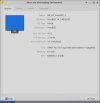I'm a non-technical person, and I recently installed FreeBSD 14.1 and Xfce onto an older HP Notebook (15-ba9000bx) without too much trouble. However, I now have a few questions about lower battery life and also seemingly slower performance. Previously I had been using Kubuntu 22.04 on this vary same machine, and under Kubuntu the battery seemed to last up to two to two and half hours, but under FreeBSD I don't seem to be able to go an hour or so before the battery begins to run flat. Also, I've noticed that it takes slightly longer for FreeBSD to completely boot, and it seems that the same browser doesn't launch nearly as quickly it did under Kubuntu.
I'm not knocking FreeBSD, it must actually be a pretty good system if a newbie can install it, but I'm wondering if my problems are due to the older laptop that I'm using, or do I possibly have too many processes launching at starup? Also, I created a four Gigabyte swap file during the installation process if that matters at all.
I really like the idea of using FreeBSD, and I'm considering using it to replace Windows 10 on primary desktop which I use for home, work, and not so much social media. I have vision impairment, I'm in my sixities, so I'm hoping to find a system that doesn't require constant maintenance and that I can use without too much trouble. Any info greatly appreciated.
I'm not knocking FreeBSD, it must actually be a pretty good system if a newbie can install it, but I'm wondering if my problems are due to the older laptop that I'm using, or do I possibly have too many processes launching at starup? Also, I created a four Gigabyte swap file during the installation process if that matters at all.
I really like the idea of using FreeBSD, and I'm considering using it to replace Windows 10 on primary desktop which I use for home, work, and not so much social media. I have vision impairment, I'm in my sixities, so I'm hoping to find a system that doesn't require constant maintenance and that I can use without too much trouble. Any info greatly appreciated.

